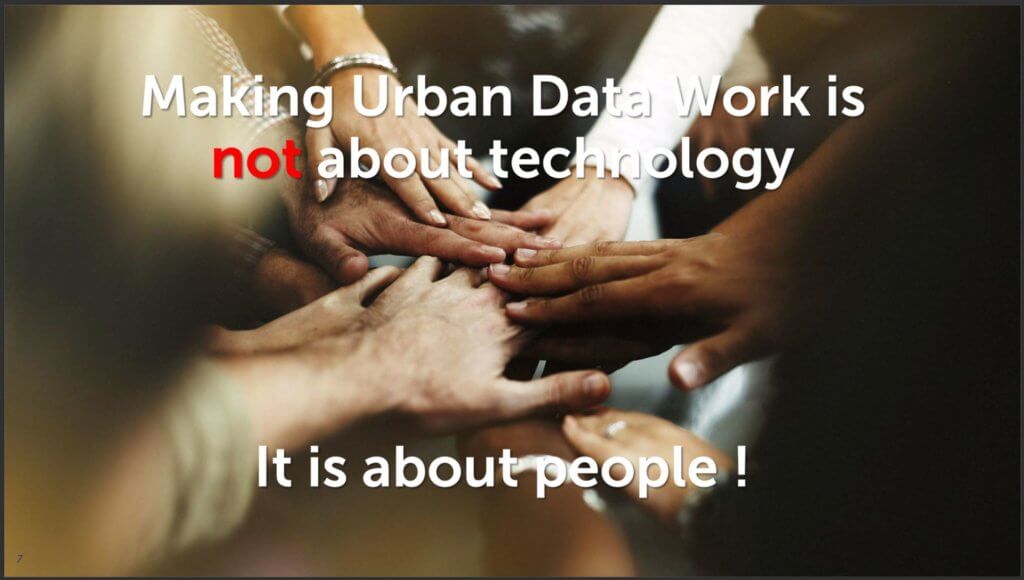Digital for the People – It’s more than Tech!
The human side of smart city technology
This October I was privileged to moderate the online session ‘Digital for the People’ for URBACT as part of the 2021 European Week of Regions and Cities. This session was on a theme that is increasingly needing discussion when talking about digital transition in cities – the idea that digital transition is made or broken by the people involved as much as by the quality of the technology involved.
We opened the session with some reflections from Mirja Vehkaperä, former MEP and member of the Finnish Parliament and now Chair of the Oulu City Board, who gave an insight into the work that Oulu have been doing over many years to embrace digital innovation. People are at the heart of this and Mirja pointed out that they say in Oulu that “Smart Cities are created together”. She talked about how Oulu has been working to see the “city as a development platform” where public and private organizations can all play a part in creating new solutions to city challenges. Mirja said that digital innovation in cities is about “making everyday life smoother”. It is easy for us to forget that simple, core purpose. In the whirlwind of technological advancement and the drive for digital transition, we need to keep hold of why we are doing it. For the people we serve.
We then looked at how well cities are progressing in response to this complex transition. Marcel van Oosterhout, Associate Executive Director at the Erasmus Centre for Data analytics in Rotterdam talked about Urban Data Platforms and shared with us their work on studying the state of urban data use and data maturity in 80 of Europe’s cities. Marcel highlighted many interesting aspects, but some key points were that cities need to take an agile approach to developing systems – thinking big but starting small and having a “licence to fail” to enable rapid testing and learning. This also included taking the time to ensure the underlying architecture is fit for the future as well as the present.

Marcel talked about partnerships and trust as two key aspects that needed to be well developed to enable this, especially public-private partnerships. This is another non-tech part of the puzzle, and he highlighted that many cities had encountered contractual complexities in establishing partnerships, alongside the more general challenges associated with effective collaboration.
He also highlighted that only 31% of surveyed cities have any sort of data platform up and running, and nearly 30% haven’t even started on anything in this regard. This fits with the results that Alisa Aliti Vlasic, from the URBACT TechPlace initiative, shared about cities’ capacity building requirements from a recent TechPlace study. Alisa highlighted that nearly 70% of respondents considered that their cities were still “digital novices” – only just setting out on their digital journey. This is important because many people we speak to feel that they are behind the curve with digital development, but in reality they may not be so far behind their peers as they think.
The TechPlace study, done by Alison Partridge, included in-depth interviews with various cities from across Europe, in addition to a comprehensive online survey to which 96 cities responded. In conjunction with work such as that presented by Marcel, this gives us an excellent insight into the state of digital transition in cities in particular, and connects some of the good examples from across Europe.
Laurie Barriol, R&D project officer for the MAtchUP project on behalf of the City of Valencia, shared some practical examples from their partner cities about how digital is being used to help improve life for cities. This highlighted a range of complexities and levels of development, but it was interesting to see that a difference could be made through solutions which addressed some simple but core public services as well as more advanced and intricate solutions.
One important thing core to the MAtchUP projects that was also clearly identified in the TechPlace study was that cities need easy access to tech knowledge and expertise in order to progress with digital transition. This was coupled with the need for a ‘demystification’ of tech – helping city leadership and other local stakeholders to understand what digital transition really means for their city and crucially, to understand that it’s not just the role of the ICT managers and that they have a critical role to play as well.
This wider point that digital is as much about the policy and people side of change as it is about the technological advancement is central to the topic of digital transition, but is still poorly understood in many places. If the policies and human side don’t support the successful design, implementation and adoption of technology, cities will get stuck with digital solutions that add little value, or work in isolation of each other, draining money and resources unnecessarily.
It’s people that make tech a success or a failure. The faster we adapt to this, the faster we will make progress and create lasting transition, where digital makes a positive difference to people’s lives. The quality of technology and digital solutions are crucial to this. But it’s like Mirja from Oulu said – digital innovation in cities is about making everyday life smoother. And that should never be a role we just leave in one department. It’s about more than just the tech. And we all have a role to play.
Further reading:
- Getting Smart About Digital Innovation
- Digital Transition in cities – how can it benefit citizens?
- URBAN DIGITAL TRANSITION – what are cities’ capacity-building needs?

